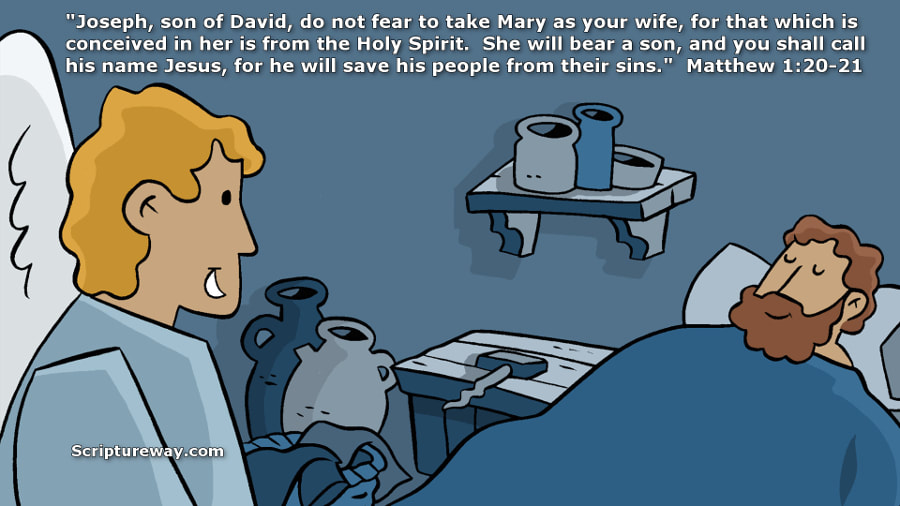Image source - Arabs for Christ at FreeBibleImages.org - Used under license  "And Jesus said, 'Neither do I condemn you; go, and from now on sin no more.'" (John 8:11) "And Jesus said, 'Neither do I condemn you; go, and from now on sin no more.'" (John 8:11)
"A bruised reed he will not break, and a faintly burning wick he will not quench; he will faithfully bring forth justice." (Isaiah 42:3)
"A bruised reed he will not break, and a smoldering wick he will not quench, until he brings justice to victory." (Matthew 12:20)
This lesson explains the meaning of the three phrases from Isaiah 42:3 -- "A bruised reed he will not break," "A faintly burning wick he will not quench," and "He will bring forth justice" which Matthew quoted in Matthew 12:20.
Consider. Are you a "bruised reed" (emotionally, spiritually, physically) needing the mending of Jesus? Come to him. Jesus specializes in mending broken lives.
The Bible verse quotations in this lesson are taken from the English Standard version (ESV) unless noted otherwise (Ref. 1).
1. "A bruised reed he will not break"
Jesus, our Savior, mends broken lives. Instead of "breaking" (or discarding) people who are weak morally, physically, or spiritually, Jesus strengthens them and binds them up (Ref. 2). Instead of dealing roughly with us when we come to him in our weakness, Jesus is tender and uses all gentleness and kindness toward us.
Example
Consider the account of the woman caught in adultery (the "bruised reed" in this example). The scribes and Pharisees brought her to Jesus seeking to stone her to death (John 8:1-11). Jesus made the woman's accusers realize their own sinful condition, and the scribes and Pharisees left the scene without casting a stone at the woman (John 8:5-9). Then, without condemning her or further "breaking" her, Jesus spoke with her tenderly as follows. "'Woman, where are they? Has no one condemned you?' She said, 'No one, Lord.' And Jesus said, 'Neither do I condemn you; go, and from now on sin no more'" (John 8:10-11).
Biblical Background
The prophet Isaiah, writing several hundred years before Christ, prophesied about the Servant who was to come (Isaiah 42:1-4). In Isaiah 42:1, God says "I have put my Spirit upon him." This prophecy was fulfilled at Jesus' baptism (Matthew 3:16-17). In Isaiah 42:3, the prophet says, "A bruised reed he will not break, and a faintly burning wick he will not quench; he will faithfully bring forth justice."
Matthew, the disciple of Jesus and the gospel writer, witnessed Jesus and his ministry. In Matthew 12:17, Matthew observed that Jesus fulfilled Isaiah's prophecy in Isaiah 42:1-4. In Matthew 12:18-21, Matthew quotes (and in places paraphrases) Isaiah 42:1-4. When Matthew stated in Matthew 12:17 that Jesus fulfilled Isaiah's prophecy, Matthew had just witnessed Jesus healing and restoring the man with the withered right hand (Matthew 12:9-14, Luke 6:6-11). That man also was an example of a "bruised reed" that Jesus restored. After Jesus healed him, the man, who likely was a mason or plasterer by trade, could return to working with his hands again for a living instead of begging bread (Ref. 3, Ref. 4). Matthew also had observed that multitudes of people -- including Gentiles (non-Jews) -- came to Jesus, and Jesus healed them all (Matthew 12:15, Mark 3:7-8). Jesus' ministry of healing and restoring "bruised reeds" then and today was and is for all people. That is good news. Biblical Meaning of "Bruised Reed" Reeds on the Side of the Jordan River Flowing into the Sea of Galilee - iStock Photo - Used under license Reeds on the Side of the Jordan River Flowing into the Sea of Galilee - iStock Photo - Used under license
Reeds are leafy cane plants that grow in watery or marshy areas. (See the picture of reeds near the Jordan river) (Ref. 5). However, scripture refers to reeds as fragile, weak, easily waved by the wind, easily broken, and unreliable when used as a staff (2 Kings 18:21, Matthew 11:7).
In Isaiah 42:3 the Hebrew word translated as "bruised" means broken or crushed but not entirely broken off (Ref. 6, Ref. 7). Thus, the words, "bruised reed," refer to a person who has been crushed or broken down by a sense of sin, by calamity, or by affliction (Ref. 7).
Good news
The good news is that Jesus Christ, the Messiah, does not break, consider useless, or discard people who are "bruised" emotionally, spiritually, or physically (Matthew 12:20). Instead, Jesus forgives our sins, tenderly binds up our wounds, and cares for us. Consider the multitudes of people who came to Jesus. The scripture says, "And many followed him, and he healed them all" (Matthew 12:15).
Similar verses
"The Lord is near to the brokenhearted and saves the crushed in spirit." (Psalm 34:18)
"He heals the brokenhearted and binds up their wounds." (Psalm 147:3) 2. "A faintly burning wick he will not quench"
When Jesus encounters people whose faith has dimmed or who have lost hope because of the hard knocks of life, Jesus does not ignore, discard, or "extinguish" us. Jesus nourishes the feeble flame, and rekindles our faith so his light in us shines brightly again.
Example
Consider the example of the man whose son had an unclean spirit which made his son mute, seized him, and threw him down in convulsions (Mark 9:14-29). The man is an example of a "smoldering wick" whose faith was dimming from the long-term afflictions of his son. The boy's father explained to Jesus that he had brought his son to Jesus' disciples, and they were not able to cast out the unclean spirit (Mark 9:18). That must have been terribly disappointing. Jesus asked that the boy be brought to him (Mark 9:19). When the boy was brought to Jesus, the unclean spirit -- seeing Jesus -- immediately threw the boy into convulsions (Mark 9:20).
The man's despair and weak faith is evident in the next verses. Jesus asked the boy's father, "How long has this been happening to him?" And he said, "From childhood. And it has often cast him into fire and into water, to destroy him. But if you can do anything, have compassion on us and help us" (Mark 9:21-22). "And Jesus said to him, 'If you can'! All things are possible for one who believes'" (Mark 9:23). "Immediately the father of the child cried out and said, 'I believe; help my unbelief!'" (Mark 9:24). Note that the man cried out to Jesus in his despair and asked Jesus to help him believe. Jesus answered the man's plea. Jesus rekindled the faith of this man who was a "faintly burning wick." Jesus commanded the unclean spirit to come out of the man's son, and the boy arose -- healed (Mark 9:25, 27). A smoldering wick (or smoking flax) Close-up of a smoldering wick - Alamy photo - Used under license Close-up of a smoldering wick - Alamy photo - Used under license
A smoldering or faintly burning wick of a lamp is just barely burning before the fuel runs out (Matthew 25:8). The King James Version in both Isaiah 42:3 (KJV) and Matthew 12:20 (KJV) refers to the faintly burning or smoldering wick as "smoking flax." In ancient lamps, the wick was a few strands of flax fiber or twisted cotton thread (Ref. 8).
The Good News
Jesus does not give up on us or chastise us when our faith becomes weak because of the calamities of life. Jesus cherishes the feeble flame, ministers to us the "oil" of grace, and through the Holy Spirit, rekindles our faith in him.
Example verses
"Let your light shine before others, so that they may see your good works and give glory to your Father who is in heaven." (Matthew 5:16).
"My grace is sufficient for you, for my power is made perfect in weakness." (2 Corinthians 12:9) 3. "He will faithfully bring forth justice"
Jesus, the Servant prophesied by Isaiah, brought forth [proclaimed], and through his followers today still proclaims the Gospel truth -- God's good news of salvation through faith in Christ -- to all people (Isaiah 42:1, Matthew 12:18, Ref. 9). In Isaiah 42:3, the justice [judgment] that the Servant would bring forth refers to the entire system of God's truth (Psalm 19:9-10 NASB, Psalm 119:160 NASB, Ref. 10, Ref. 11).
Note that Isaiah prophesied that the Servant would spread justice [God's system of truth] not just to the Jewish people, but to the "nations" [all races, all people] (Isaiah 42:1, Matthew 12:17-18, Ref. 11, Ref. 12). Through Christ, the Christian gospel -- God's truth -- is being preached and taught by Jesus' followers throughout the world today (Matthew 28:19-20, Mark 16:15-16).
Apply. Are you a "bruised reed" (morally, physically, emotionally, or spiritually weak) needing the mending of Jesus? Come to Jesus now. In prayer, tell him your needs. Jesus will forgive your sins, and he will mend your broken life.
Are you a "faintly burning wick" with faith or hope that is nearly extinguished by affliction or by the calamities of life? Put your faith and trust in Jesus again. Jesus will supply the "oil" of his grace to rekindle your faith into a bright flame that will shine and bless others.
References
1. https://www.biblegateway.com/versions/English-Standard-Version-ESV-Bible/ 2. https://biblehub.com/commentaries/poole/isaiah/42.htm Matthew Poole's Commentary - Isaiah 42:3 3. https://en.wikipedia.org/wiki/Healing_the_man_with_a_withered_hand 4. https://biblehub.com/commentaries/gill/matthew/12.htm Gill's Exposition of the Entire Bible - Matthew 12:10 5. https://biblehub.com/hebrew/7070.htm 6. https://biblehub.com/hebrew/7533.htm 7. https://biblehub.com/commentaries/barnes/isaiah/42.htm Barnes' Notes on the Bible - Isaiah 42:3 8. https://www.gotquestions.org/smoking-flax-not-quench.html 9. https://biblehub.com/greek/518.htm Note, the Greek word for "proclaim" in Matthew 12:18 10. https://biblehub.com/hebrew/4941.htm 11. https://biblehub.com/commentaries/barnes/matthew/12.htm Barnes' Notes on the Bible - Matthew 12:18 12. https://biblehub.com/greek/1484.htm
0 Comments
This lesson explains biblically what it means to commit one's "way" to the Lord. The verses below are taken from the New American Standard Bible (NASB 1995 version) unless noted otherwise (Ref. 1).
Consider. In the context of trusting in the Lord, what do you think David had in mind when he wrote, "Commit your way to the Lord"? (Psalm 37:5)
Introduction
David wrote Psalm 37 about the security of those who trust in the Lord (see the heading for Psalm 37:1-6). In Psalm 37:3, David tells us, "Trust in the Lord and do good; Dwell in the land and cultivate [feed on] [God's] faithfulness" (Ref. 2, brackets added). To "trust" in the Lord means to be confident, sure, and secure in the Lord (Strong's Exhaustive Concordance - Ref. 3).
Commit your way to the Lord
In Psalm 37:5, the scripture instructs us to "Commit your way to the Lord." Let's look into the word meanings for "commit" and "way" in this phrase.
a. The Hebrew word translated as "commit" literally means to "roll" or "roll away" (Ref. 4, Genesis 29:10). The idea is for a person to roll or roll away a large stone (figuratively, a burden) which is too heavy for them to bear from themself onto the Lord, imploring his help (Ref. 5). b. The Hebrew word derek translated as "way" in Psalm 37:5 has both a literal and a figurative meaning. Derek literally means way, road, distance, journey, or manner (Ref. 6). Figuratively, derek means our entire course or journey of life (Brown-Driver-Briggs -- Ref. 6). When we confidently commit our "way" to the Lord, we entrust him with our life's journey including all of our cares, burdens, plans, and business. Similar verse:
Trust also in Him
Committing your way to the Lord and trusting in him go hand in hand. Trusting in the Lord means putting your confidence in him (Ref. 3). When we roll our life's journey, and all that weighs on us, on him, we have confidence that our life is in good hands (Ref. 8).
Similar verses:
And He will do it
The Hebrew verb translated in Psalm 37:5 NASB as "will do it" means literally to do or make, and more broadly, to accomplish (Ref. 10). The English Standard Version translates this phrase as "He will act" (Psalm 37:5 ESV). The King James Version translates this phrase as "He shall bring it to pass" (Psalm 37:5 KJV).
When we roll our life's journey, and all that weighs on us onto our Lord Jesus, we have confidence and are sure that he will act and that he will guide us in the way that he determines is good (Romans 8:28, Proverbs 16:9).
Apply. Every day, in prayer, commit yourself and your way to the Lord Jesus. Ask him and seek his direction for your life, that you may walk in the purpose he has for your life (Matthew 7:7). Ask him to give you wisdom for your plans and decisions (James 1:5). Trust him to provide for your needs in accordance with his will (Philippians 4:19, 1 John 5:14). Cast your worries and burdens onto him (1 Peter 5:7 NIV). Confidently know that the Lord Jesus will act in your behalf (Psalm 37:5). He will bring to pass what is good for you according to his purpose (Romans 8:28).
Thank the Lord and praise him for his answers to your prayers (Philippians 4:6 TLB). Tell others, with gratitude and humility, what God has done for you (Psalm 66:16). Your witness will encourage other people to commit their way to the Lord.
Related Lessons
"About the Way" - John 14:6 "The Way of the Lord (Old Testament)" - Deuteronomy 5:33 "Cast All Your Anxiety on Him" - 1 Peter 5:7
References
1. https://www.biblegateway.com/versions/New-American-Standard-Bible-NASB1995/ 2. https://biblehub.com/commentaries/pulpit/psalms/37.htm Pulpit Commentary - Psalm 37:3 3. https://biblehub.com/hebrew/982.htm 4. https://biblehub.com/hebrew/1556.htm 5. https://biblehub.com/commentaries/poole/proverbs/16.htm Matthew Poole's Commentary - Proverbs 16:3 6. https://biblehub.com/hebrew/1870.htm 7. https://biblehub.com/hebrew/4639.htm 8. https://biblehub.com/commentaries/king-en/psalms/37.htm Kingcomments Bible Studies - Psalm 37:5 9. https://biblehub.com/hebrew/734.htm 10. https://biblehub.com/hebrew/6213.htm
"And let the peace of Christ rule in your hearts, to which indeed you were called in one body. And be thankful." (Colossians 3:15 ESV)
This lesson defines the peace of Christ and explains how we can have the peace of Christ ruling in our hearts. Bible verse quotations are from the English Standard Version (ESV) unless indicated otherwise (Ref. 1).
Consider. Do you have the peace of Christ ruling in your heart?
1. The peace of Christ is the tranquility of our heart and mind knowing that God has saved us and has forgiven us through his Son Jesus
As believers in Christ, our hearts are calm and tranquil because we know we are saved by God's grace through faith in Christ (Thayer's Greek Lexicon - Ref. 2, Ephesians 2:8-9). We have the peace of Christ in our hearts because we know that God loves us and has forgiven our sins (Romans 5:1, Romans 5:8, 1 John 1:9). We have the peace of Christ in our hearts because we know we have received God's gift of eternal life (John 3:16, Romans 6:23, John 10:27-28).
When we trust in Jesus as our Lord and Savior, we have nothing to fear from God. We have peace with God. Jesus said, "Let not your heart be troubled; you believe in God, believe also in Me" (John 14:1 NKJV). 2. The peace of Christ comes from Christ, not from the world. Jesus is the giver of true peace.
On the night before his crucifixion and death, Jesus was preparing his disciples for his departure from them. Jesus told them about this precious gift that he was giving them -- his peace. Jesus gave them -- and he gives us, people who have faith in him -- the same gift, his peace. Jesus says, "Peace I leave with you; my peace I give to you. Not as the world gives do I give to you. Let not your hearts be troubled, neither let them be afraid" (John 14:27).
The things of the world will not give us peace (1 John 2:15-17). Only Jesus, the one whose nature is peace, gives us true peace, the peace that surpasses understanding (Philippians 4:6-7). True peace, the peace of Christ, is tranquility of our soul despite the worldly circumstances around us. 3. The peace of Christ rules in our hearts when we are completely submitted to his will and have yielded control of our lives to him
The Greek word translated as "rule" in Colossians 3:15 means to direct and control (Thayer's Greek Lexicon - Ref. 3). To have the peace of Christ ruling in our hearts, we must yield completely to God's direction and control of our lives -- present and future. Don't be like Jonah who knew God's will for him and then rebelled against God (Jonah 1:1-3). Be like our Lord Jesus who lived on earth to do his Father's will (John 6:38) and said to his heavenly Father, "not my will, but thine, be done" (Luke 22:42 KJV).
When we trust God and are yielded to God's will for us in each of life's circumstances, we will know the peace of Christ. The apostle Paul writes, "And the peace of God, which surpasses all understanding, will guard your hearts and your minds in Christ Jesus" (Philippians 4:7). The peace of God [that peace which reassures our heart] keeps our thoughts and our hearts quiet and at rest as we trust in Christ Jesus (Philippians 4:7 AMP, Philippians 4:7 TLB). 4. God calls us as believers in Christ to live as one body in the peace of Christ
The Lord Jesus, by his blood shed on the cross, has made Jewish and Gentile believers into one (Ephesians 2:11-14). He has made believers of diverse (ethnic, national, gender, economic, civilized/uncivilized, etc.) background into one body (Galatians 3:28, Colossians 3:11, Ref. 4). He also calls us -- as diverse and uniquely gifted believers -- to live in unity as one body of Christ (Ephesians 4:1-6, Colossians 3:15, 1 Corinthians 12:12). Yet, Jesus is our peace (Ephesians 2:14). We can live with our brothers and sisters in Christ in the peace of Christ when we put on a heart of compassion, have patience with one another, forgive one another, and love one another as the scriptures instruct and as Jesus commanded (Colossians 3:12-14, John 13:34).
5. And be thankful
An "attitude of gratitude" is a hallmark of a Christian who is at peace with God, themselves, and other people. Through Christ, we can be thankful through difficult circumstances (1 Thessalonians 5:16-18). We have the peace of Christ knowing that our Lord Jesus loves us, has forgiven us, is with us in the present, and assures us of our future with him (Philippians 4:4-7, John 14:2-3 AMP).
Prayer. Lord Jesus, I yield control of my life to you. I submit to your will and direction for my life. Come, Lord Jesus, and rule in my heart. Thank you for giving me your peace. Help me to live in peace with others and to share you, the giver of peace, with others. Amen.
Related Lessons
"The Remedy for a Troubled Heart (John 14:1)" "The Peace of Believing Prayer (Philippians 4:6-7)" "What is Eternal Life?" - John 17:3
References
1. https://www.biblegateway.com/versions/English-Standard-Version-ESV-Bible/ 2. https://biblehub.com/greek/1515.htm 3. https://biblehub.com/greek/1018.htm 4. https://biblehub.com/commentaries/barnes/colossians/3.htm Barnes Notes on Colossians 3:11
Image source: Sweet Publishing / FreeBibleimages.org.
"Now the angel of the Lord came and sat under the terebinth at Ophrah, which belonged to Joash the Abiezrite, while his son Gideon was beating out wheat in the winepress to hide it from the Midianites. And the angel of the Lord appeared to him and said to him, 'The Lord is with you, O mighty man of valor.'" (Judges 6:11-12)
"He [the beloved Son of God - Col. 1:13] is the image of the invisible God, the firstborn of all creation." (Colossians 1:15, brackets added)
This lesson teaches that the angel of the Lord who appeared in the Old Testament to Hagar, Moses, Gideon, and others is the preincarnate Lord Jesus Christ. The angel of the Lord in the Old Testament bears the unmistakable marks of deity and speaks as "the Lord" and as "God" (Ref. 1 below). This lesson describes 1) Who is the angel of the Lord?, 2) What is the main characteristic of the angel of the Lord that indicates deity?, and 3) Where in scripture has the angel of the Lord appeared?
Consider. Do you believe that the Lord Jesus Christ, the Son of God, appeared visibly in the Old Testament?
The scripture quotations in this lesson are taken from the English Standard Version (ESV) unless noted otherwise (Ref. 2).
1. Who Is the angel of the Lord in the Old Testament?The Preincarnate Christ -- Jesus in the Old Testament
The angel of the Lord who appeared to men and women in the Old Testament was the preincarnate Lord Jesus Christ. These temporary appearances of Christ in the Old Testament are called "preincarnate" because they occurred before Jesus was conceived by the Holy Spirit in Mary (Luke 1:30-35) and before "the Word became flesh and dwelt among us" (John 1:14).
Do not be surprised that Jesus Christ, the beloved Son of God (Colossians 1:13), has appeared in the Old Testament. He is the creator of all things, and therefore predates the creation of all things (Colossians 1:16-17, John 1:1-3). Micah the prophet wrote, "But as for you, Bethlehem Ephrathah, Too little to be among the clans of Judah, From you One will go forth for Me to be ruler in Israel. His goings forth [appearances] are from long ago, From the days of eternity" (Micah 5:2 NASB 1995, brackets added from a NASB 1995 footnote). Keep also in mind that Jesus is the visible expression of God (Colossians 1:15, Hebrews 1:3). Whenever a person in the Old Testament visibly saw God (for example, Gideon recognized the angel of the Lord as the Lord God in Judges 6:19-23), it was Son sent forth by the Father -- the second person of the Trinity of the Father, Son, and Holy Spirit (Matthew 3:16-17, Matthew 28:19, Ref. 3 below). 2. What is the main characteristic of the angel of the Lord that indicates deity?
As you read through the scripture references below in Section 3, consider the main "clue" that indicates the angel of the Lord is deity:
3. Where in scripture has the angel of the Lord appeared?
The angel of the Lord speaking as the Lord himself appears throughout the Old Testament beginning with Genesis 16:1-13 (appearance to Hagar) through Zechariah 3:1-10 (appearance to Joshua the high priest). For your reference and further study, the page, "Bible Verses About the Angel of the Lord in the Old Testament" provides more than 15 scripture reference about the angel of the Lord.
Subsections a, b, and c below discuss three appearances of the angel of the Lord -- to Hagar, Moses, and Gideon. a. Example 1 -- The angel of the Lord appears to Hagar
Read Genesis 16:1-14. Genesis 16:7 is the first mention of the angel of the Lord in the Old Testament. Hagar was in distress because of harsh treatment from Sarai, Abram's wife, and Hagar had fled from Sarai's presence (Genesis 16:6).
(1). In Genesis 16:7 the angel of the Lord took the initiative and "found" Hagar. The initiative of the angel of the Lord in Genesis 16:7 is similar to the initiative the Lord Jesus takes during his ministry in the New Testament. In Luke 15:3-6, Jesus gives the example of seeking and finding the "lost sheep." In Luke 19:10, Jesus referred to himself and said that he came "to seek and to save the lost." (2). Hagar recognized that the one speaking with her was the Lord. Genesis 16:13 tells us, "She called the name of the Lord who spoke to her, 'You are a God of seeing, for she said, 'Truly here I have seen him who looks after me.'" b. Example 2 -- The angel of the Lord appears to Moses in the burning bush
Read Exodus 3:1-14. The people of Israel were sighing and crying out to God for help because of their bondage in Egypt (Exodus 2:23). God heard their groaning (Exodus 2:24). The verses in Exodus 3:7-12 tell us why the Lord came down -- to deliver his people out of the hand of the Egyptians (Exodus 3:8) and to appoint Moses to go to Pharaoh that he might bring God's people, the children of Israel, out of Egypt (Exodus 3:10).
(1). Exodus 3:2 identifies the one appearing to Moses in the burning bush as the angel of the Lord. (2). Exodus 3:4 identifies the one speaking to Moses as "the Lord" and as "God." See also Exodus 3:7 and 3:14. (3). In Exodus 3:5 God tells Moses to remove his sandals, for he is standing on "holy ground." The presence of God made the ground holy. The removal of sandals or shoes still is the usual mark of reverence upon entering a mosque, or other holy place, in the East (Ref. 4). (4). In Exodus 3:6, God also says to Moses, "I am the God of your father, the God of Abraham, the God of Isaac, and the God of Jacob." Moses realizes that it is God who is speaking to him, and Moses hides his face. (5). In Exodus 3:10, God tells Moses his mission -- "Come, I will send you to Pharaoh that you may bring my people, the children of Israel, out of Egypt." Then, in Exodus 3:12 God tells Moses, "I will be with you." (6). In Exodus 3:14, God tells Moses God's name, "I AM WHO I AM." And he said, "Say this to the people of Israel: 'I AM has sent me to you.'" (7). Recall that in John 8:58, Jesus said, "Most assuredly, I say to you, before Abraham was, I AM" (John 8:58 NKJV). The Lord Jesus -- the Son of God -- is the same I AM who appeared to Moses as the angel of the Lord in the burning bush and who spoke with Moses. c. Example 3 -- The angel of the Lord appears to Gideon
Read Judges 6:11-24. After Joshua's death (Judges 2:6-8), the Israelites fell into a repetitive pattern of sin (Judges 2:11, 3:5-7 NLT) followed by temporary rescue through human judges the Lord raised up to save them (Judges 2:16-19, 3:9-11 NLT). Before the angel of the Lord visited Gideon, "The people of Israel did what was evil in the sight of the Lord, and the Lord gave them into the hand of Midian seven years" (Judges 6:1 NASB).
(1). In Judges 6:11 NASB, the angel of the Lord appeared to Gideon as a man sitting under an oak tree. Judges 6:21 tells us that the angel of the Lord had a staff in his hand. A staff was the ordinary accompaniment of an Eastern traveler (Ref. 5, Genesis 32:10, Exodus 12:11, Mark 6:8). (2). In Judges 6:12 NASB, the angel of the Lord called Gideon a "valiant warrior" [literally, a mighty man of valor] (Ref. 6, Ref. 7). The angel of the Lord told Gideon, "The Lord is with you" (Judges 6:12 NASB). Note that the Lord later worked with Gideon to make him into a valiant warrior by strengthening Gideon's faith (Judges 6:36-40 - sign of the fleece, Judges 7:9-15). (3). In Judges 6:14 the Lord gave Gideon his mission assignment. "Go in this might of yours and save Israel from the hand of Midian; do not I send you?" (4). In Judges 6:17-19 NASB, Gideon asked the angel of the Lord not to depart until Gideon prepared an offering. (5). In Judges 6:20-21, the angel of the Lord accepted Gideon's offering, touched it with the tip of his staff, and fire sprang up from the rock and consumed the meat and the unleavened cakes. The angel of the Lord then vanished from Gideon's sight. (6). Gideon then realized that the one who had appeared to him was the Lord himself. "Then Gideon perceived that he was the angel of the Lord. And Gideon said, 'Alas, O Lord God! For now I have seen the angel of the Lord face to face'" (Judges 6:22 NASB). Yes, Gideon indeed had seen the Son of God face to face. It is the Lord Jesus, the second person of the Trinity, who makes the invisible God visible (Colossians 1:15). (7). After the angel of the Lord revealed himself as the Lord God to Gideon (Judges 6:22 NASB), the Lord strengthened Gideon's faith with the sign of the fleece (Judges 6:36-40). The Lord also gave instructions to Gideon to reduce the number of men who were with Gideon so that they would depend on the Lord rather than themselves (Judges 7:2). The Lord also provided the equipment the men would need to accomplish their mission (Judges 7:8). A takeaway for us today is that when the Lord Jesus calls us to a mission, he will strengthen our faith and will equip us to accomplish that mission. 4. Other Appearances of Christ in the Old Testament
The page, "Bible Verses About the Angel of the Lord in the Old Testament" provides several additional references about the angel of the Lord. For example, see Judges 13:1-4 (appearance to Manoah and his wife, the parents of Sampson), 1 Chronicles 21:1-17 (appearance to David), and Zechariah 3:1-10 (appearance to Joshua the high priest).
The Old Testament also provides examples where the Lord appears visibly to men and women, yet the title, "the angel of the Lord" is not mentioned: Genesis 3:8-24 -- The Lord comes walking in the garden seeking Adam and Eve after they had sinned. Genesis 18:1-33 -- The Lord appears to Abraham. Exodus 33:9-11 -- The Lord speaks face to face with Moses. Joshua 5:13-15 -- The "commander of the army of the Lord" appears to Joshua. He accepts worship from Joshua (Joshua 5:14). (A "regular angel" would not accept worship - Revelation 22:8-9, Hebrews 1:13-14). The presence of the Lord makes the ground holy (Joshua 5:15, Exodus 3:4-5). 5. Note about "an angel of the Lord" versus "the angel of the Lord" in the KJV New Testament
In the Old Testament, the references to the angel of the Lord bear the marks of deity, and the angel of the Lord speaks as God ("the Lord said ..." or "God said ..."). The Old Testament references discussed in this lesson refer to the preincarnate Lord Jesus Christ. The preincarnate Christ does not appear after the conception and birth of Christ (Luke 1:26-35, John 1:14).
In the New Testament, after the conception of the Son of God in Mary (Luke 1:26-35), the King James Version (KJV) says "the angel of the Lord" appeared to Joseph in a dream (Matthew 1:20 KJV). I respectfully suggest that in the KJV this would have been better translated as "an angel of the Lord" instead of "the angel of the Lord." The angel who appears to Joseph in a dream informs Joseph to take Mary as his wife, that the child conceived in Mary is of the Holy Spirit, and to name the child Jesus (Matthew 1:20-21 KJV). The angel acts and speaks as a ministering spirit as described in Hebrews 1:13-14 KJV rather than speaking as the Lord himself. Later English translations such as ESV, NIV, NASB, and NKJV all translate Matthew 1:20 saying "an angel of the Lord" instead of "the angel of the Lord." The same comments about an angel of the Lord apply to the KJV in Matthew 2:13, Matthew 28:2, Acts 12:7, Acts 12:23, and Acts 27:23.
Summary. The angel of the Lord who appeared in the Old Testament to Hagar, Moses, Gideon, and others is the preincarnate Lord Jesus Christ, the second person of the Trinity of the Father, Son, and Holy Spirit (Matthew 28:19). Whenever a person in the Old Testament saw the angel of the Lord, it was the Son sent forth by the Father to help people in need such as Hagar and to recruit people such as Moses and Gideon for mighty missions. Since the beginning (Genesis 1:1), the Son of God is the visible image of the invisible God (Colossians 1:15).
Prayer. Thank you, Lord Jesus, for "seeing" us like Hagar, and coming to us when we are in distress and need your care. Thank you, Lord Jesus, for giving us our mission assignments like Moses and Gideon, and for equipping us to accomplish what you have in mind for us. Thank you, Lord Jesus, for strengthening our faith to serve you "faith-fully" all our lives as we depend on you.
Related Lessons
"Who Is Jesus? (The Same God Who Spoke to Moses)" - John 8:58 "The Authority of Jesus" - Matthew 28:18 "You Shall Call His Name Jesus (Matthew 1:21)"
References
1. Major Bible Themes, Lewis Sperry Chafer and John F. Walvoord, Zondervan Publishing House, 1979, p. 54 2. https://www.biblegateway.com/versions/English-Standard-Version-ESV-Bible/ 3. Major Bible Themes, Lewis Sperry Chafer and John F. Walvoord, Zondervan Publishing House, 1979, p. 39-40 4. https://biblehub.com/commentaries/cambridge/exodus/3.htm Cambridge Bible for Schools and Colleges - Exodus 3:5 5. https://biblehub.com/commentaries/ellicott/judges/6.htm Ellicott's Commentary on Judges 6:21 6. https://biblehub.com/hebrew/1368.htm 7. https://biblehub.com/hebrew/2428.htm
Image Copyright by Didier Martin, source - FreeBibleImages.org  An Angel of the Lord Appeared to Joseph in a Dream - Matthew 1:20-21 - Used under license An Angel of the Lord Appeared to Joseph in a Dream - Matthew 1:20-21 - Used under license
"She will bear a son, and you shall call his name Jesus, for he will save his people from their sins." (Matthew 1:21)
This lesson explains the meaning of the name "Jesus" that an angel of the Lord instructed Joseph to give to our Savior at his birth.
Consider. How does the name "Jesus" explain what his mission was to be?
The Bible verse quotations in this lesson are taken from the English Standard Version (ESV) unless noted otherwise (Ref. 1).
What does "Jesus" mean?
The Greek word for the name, "Jesus," is Iésous (pronounced ee-ay-sooce'), and means Yahweh saves or Yahweh is salvation (Ref. 2). Yahweh is the vocalization of the four consonants of God's name, YHWH, in the Old Testament (Exodus 3:14 NASB, Ref. 3).
"Jesus" is the Greek form of the Hebrew name, "Joshua." The Hebrew word for "Joshua" is Yehoshua (pronounced yeh-ho-shoo'-ah), and means the Lord is salvation (Ref. 4). "Joshua" was a common name in the Old Testament, especially the name of Moses' successor (Joshua 1:1-2). What does "Christ" mean?
Jesus is distinguished from others by his title, "the Christ" (Matthew 1:16). The Greek word for "Christ" is Christos (pronounced khris-tos'), and means the Messiah, the Anointed One (Ref. 5).
Who was the father of Jesus?
The scriptures are clear that God is the father of Jesus the Christ. The angel Gabriel told Mary before she conceived Jesus, "The Holy Spirit will come upon you, and the power of the Most High will overshadow you; therefore the child to be born will be called holy—the Son of God" (Luke 1:35). An angel of the Lord later told Joseph who was betrothed to Mary, "Joseph, son of David, do not fear to take Mary as your wife, for that which is conceived in her is from the Holy Spirit" (Matthew 1:20). That is why in Matthew 1:21, the angel told Joseph, "She will bear a son," and not, "She will bear you a son." Compare Matthew 1:21 with Genesis 17:19 and Luke 1:13.
Why did Jesus come to earth?To save his people from their sins
Matthew 1:21 tells us why Jesus came to earth -- to "save his people from their sins." The name "Jesus" fits perfectly with Jesus' mission because Jesus' name means "Yahweh [or, God] is salvation." To "save" means to rescue or deliver from danger and bring into divine safety (HELPS Word-studies - Ref. 6, Ref. 7, 1 Timothy 1:15). Jesus came to rescue believers -- we who believe in and have faith in Jesus -- from the penalty and power of sin (Ref. 6, Romans 5:8-9). The opportunity to become saved is available to all persons who will believe in Jesus regardless of their background as Jew or Gentile (Acts 4:12, Acts 8:36-37 NKJV, Acts 16:30-31).
Apply. Be a person who believes in Jesus Christ who came to earth to save you from your sins. Put your faith, trust, and confidence in the Lord Jesus, and you will be saved (Acts 16:31). Confess your sins to him today, and he will forgive your sins and will give you the gift of eternal life (1 John 1:9, Romans 6:23).
Related Lessons
"Why Did Jesus Come?" -- John 3:17 "What Does 'To Be Saved' Mean in the New Testament?" -- Acts 16:31
References
1. https://www.biblegateway.com/versions/English-Standard-Version-ESV-Bible/ 2. https://biblehub.com/greek/2424.htm 3. https://www.biblegateway.com/resources/encyclopedia-of-the-bible/Yahweh 4. https://biblehub.com/hebrew/3091.htm 5. https://biblehub.com/greek/5547.htm 6. https://biblehub.com/greek/4982.htm 7. https://www.scriptureway.com/home/why-did-jesus-come
"And I, if I am lifted up from the earth, will draw all people to Myself." (John 12:32 NASB)
"And I, if I be lifted up from the earth, will draw all men unto me." (John 12:32 KJV)
This lesson explains what Jesus meant when he said, "And I, if I am lifted up from the earth, will draw all people to Myself" (John 12:32).
Consider. What are you doing in response to Jesus' drawing of you? How are you responding to Jesus' influence in your life?
The scripture references in this lesson are taken from the New American Standard Bible (NASB) unless noted otherwise (Ref. 1).
And I
The "I" here at the beginning of John 12:32 is strongly emphatic (Ref. 2). In John 12:32 Jesus points to himself versus his opposition -- the "ruler of this world" who will be cast out (John 12:31, Matthew 4:8-10). Jesus will assert his rule over the world, and Jesus will draw all (people) to himself (Ref. 2).
If I am lifted up from the earth
Jesus knew with certainty and accurately predicted that his death would be by crucifixion (John 12:32-33, John 3:14-15, Numbers 21:6-9 ESV). Jesus knew that men would crucify him and elevate him above the earth (John 19:17-18). The Greek word for "lift up" in John 3:14 and John 12:32 has two meanings, first to elevate, and second to exalt (Ref. 3).
The people who crucified Jesus thought they were ending his life. However, they didn't realize that God would exalt Jesus through his death, his resurrection, and his ascension to heavenly glory at the right hand of the throne of God (Matthew 28:1-7, Acts 1:8-11, Philippians 2:5-11, Ephesians 1:17-23, Hebrews 12:2). Will draw all (people) to Myself
Jesus said in John 12:32 "And I, if I am lifted up from the earth, will draw all to Myself" (Ref. 4 - Berean Literal Bible). (The NASB and KJV translations add the word "people" or "men" after the word "all"). The Greek word for "draw" [helkó, pronounced hel-koo'-o] means to induce influence, or attract by inward power (Ref. 5). The Greek word for "all" [pas] in John 12:32 means the whole, every kind of (Ref. 6).
Beginning at Pentecost (after Jesus' ascension) and continuing to this day, the drawing of people to Christ is accomplished by the work of the Holy Spirit (Acts 1:8, Acts 2:14-21, Ref. 2). The Holy Spirit's work of drawing people to Christ is for all people -- regardless of ethnicity, national identity, gender, geographic location, or economic or social means. The Holy Spirit does not exclude you from being drawn to Christ because of "who you are." The drawing influence of the Holy Spirit for all people to come to Jesus may be accepted or rejected. Mankind has free will. Some people will reject the influence of the Holy Spirit and the spiritual attraction power of Jesus Christ. Others, praise God, will yield to the drawing influence of the Holy Spirit and will receive Jesus Christ as their Lord and Savior. In Jesus Christ, believers will find acceptance, forgiveness, salvation, love, spiritual empowerment, and the gift of eternal life. How are you responding to the drawing power and influence of Jesus Christ?
Apply. Respond with joy to the drawing power and influence of Jesus Christ, who was lifted up, and died for you. Receive him unto yourself. He will welcome you, forgive your sins, guide you, and will give you eternal life. (Luke 15:20-24, 1 John 1:9, John 16:13, John 3:14-16, Romans 6:23).
References
1. https://www.biblegateway.com/passage/?search=John+12%3A32&version=NASB 2. https://biblehub.com/commentaries/ellicott/john/12.htm Ellicott's Commentary for English Readers - John 12:32 3. https://biblehub.com/greek/5312.htm 4. https://biblehub.com/john/12-32.htm 5. https://biblehub.com/greek/1670.htm 6. https://biblehub.com/greek/3956.htm
"I will ask the Father, and He will give you another Helper, so that He may be with you forever ..." (John 14:16)
"But the Helper, the Holy Spirit, whom the Father will send in my name, he will teach you all things and bring to your remembrance all that I have said to you." (John 14:26)
This lesson explains 1) Who is the Helper?, 2) Why did Jesus ask the Father to send his disciples another Helper?, and 3) How does the Helper -- the Holy Spirit -- aid us as believers in Christ today?
The scripture references in this lesson are taken from the English Standard Version (ESV) and the New American Standard Bible (NASB) (Ref. 1, Ref. 2).
Consider. How have you experienced the Holy Spirit helping you in your life? How would you like the Holy Spirit to help you in your life going forward?
On the night before his crucifixion and death, Jesus spoke with his remaining disciples to prepare them for his departure (John 13:33, 14:1-2). Judas Iscariot had already left to betray Jesus and was not the beneficiary of these promises (John13:26-30). Jesus told his disciples, "I will ask the Father, and He will give you another Helper, so that He may be with you forever ..." (John 14:16).
Who is the Helper?
In John 14:16, the Greek word for "Helper" is paraklétos (pronounced par-ak'-lay-tos), and means one who is called to the aid of another (Ref. 3, Ref. 4). Paraklétos signifies "an advocate in a court of law, but more widely a helper in any form whatsoever" (Ref. 4). The ESV, NIV, and KJV translate paraklétos as "Helper," "Advocate," and "Comforter" respectively. Jesus identifies the Helper as the Holy Spirit (John 14:26). Jesus also describes the Helper as the "Spirit of truth" in John 14:17, 15:26, and 16:13.
Why did Jesus ask the Father to send his disciples another Helper?
Jesus was about to leave his disciples through his suffering and death on a cross (John 19:1-3, 19:15-19). After his resurrection, Jesus would go to the Father (John 14:2, 16:28; 20:17, Acts 1:8-9). Jesus' disciples would need another Helper -- someone to be the strong continuer of Jesus' presence, to be their permanent companion (Ref.4). The Helper would teach them all things and would guide them into all the truth (John 14:26, 16:13).
The Helper would "be with" and "be in" (after Pentecost) Jesus' disciples permanently. Whereas Jesus during his earthly ministry was with them for three years, the Helper -- the Holy Spirit -- would be with them (and is with us as Jesus' disciples) to the end of time (John 14:16-17, Ref.4). Jesus' disciples also need to be strengthened and power-filled by the Holy Spirit to accomplish the mission Jesus sends us to in an unfriendly world (Mark 13:9-11, Mark 16:15-16, Acts 1:8). What is the role of the Holy Spirit in our lives as believers in Christ?How does the Holy Spirit help us?
The following scriptures describe the many ways the Holy Spirit helps us as people who believe in and trust in Jesus Christ as our Lord and Savior.
The Holy Spirit is with us and dwells in us permanently. John 14:16-17 The Holy Spirit strengthens us and is our spiritual companion forever. The Holy Spirit teaches us all things and calls to our remembrance all that Jesus has said to us. John 14:26 The Holy Spirit especially is our teacher for helping us to understand God's word. The Holy Spirit bears witness to us about Jesus and helps us bear witness about Jesus to others. John 15:26-27 The Spirit of truth guides us into all the truth. John 16:13 The Greek word for truth in the New Testament is alétheia, pronounced phonetically as "al-ay'-thi-a." In ancient Greek culture, alétheia was synonymous for "reality" as the opposite of illusion, i.e., fact (Ref. 5). Jesus not only taught the truth but also is the truth (John 14:6). The Holy Spirit gives us power to be Jesus' witnesses wherever God sends us at home or abroad in the world. Acts 1:8, 1 Thessalonians 1:5 The Holy Spirit gives us the words to speak when we face trials, persecution, and suffering for our faith in Christ. Mark 13:9-11 The Holy Spirit guides us in what to do (Acts 10:19-20) and where to go (Acts 16:6-10). The Holy Spirit helps us to put to death the deeds of the flesh. Romans 8:13-14 The Holy Spirit helps us to know that we are the adopted children of our heavenly Father. Romans 8:16, Galatians 4:6, Ephesians 1:3-5 The Holy Spirit intercedes for us and helps us to pray. Romans 8:26 The Holy Spirit gives us spiritual gifts for the purpose of serving others and building up the body of Christ. 1 Corinthians 12:1-11, Romans 12:6-8, Ephesians 4:4-12 The Holy Spirit's work in us helps us to bear spiritual fruit that benefits ourselves as well as others. Galatians 5:22-23 The Holy Spirit strengthens us with power in our inner being whether we are men, women, or children. Ephesians 3:14-16 The Holy Spirit fills us with rivers of living water so we can be a spiritual blessing that refreshes and comforts others. John 7:38-39 The presence, companionship, and strengthening of the indwelling Holy Spirit is Jesus' gift to all who put their faith and trust in him. Thanks be to God for such a precious gift!
Apply. If you are not yet a believer in Jesus Christ, confess your sins to him, yield control of your life fully to him, and he will fill you with the Holy Spirit. If you are a believer in Jesus Christ, thank God each day for the presence of the Holy Spirit with you and for helping you to understand and apply God's word to your life. Thank God for the Holy Spirit guiding you in making godly decisions and for strengthening you through the challenges -- and for some of you, persecution -- you are going through. Thank God for the Holy Spirit helping you to discern, to prepare for, and to do boldly the life work that God reveals to you to do in Jesus' name.
Related Lessons
"The Spirit of Truth" - John 16:13 "Jesus is the Truth" - John 14:6 "Adoption as Sons" - Ephesians 1:4-5 "Characteristics of a Child of God - Part 1" - Matthew 7:16 "What is Living Water in the Bible?" - John 4:10
References
1. https://www.biblegateway.com/passage/?search=John+14%3A16&version=ESV 2. https://www.biblegateway.com/passage/?search=John+14%3A16&version=NASB 3. https://biblehub.com/greek/3875.htm 4. https://biblehub.com/commentaries/maclaren/john/14.htm MacLaren Expositions of Holy Scripture - John 14:16-17 5. https://biblehub.com/greek/225.htm |
Daily Bible Verse
(Click the link above) Author
Mr. Whitney V. Myers. Christian. For more information, please visit the Author Page. Posting ScheduleI plan to provide new postings about once a month. Planned Topics(subject to change) Recent Posts(most recent three months) Popular Posts(top 10) Categories
All
Archives
March 2024
|
|
Copyright 2018-2024 Whitney V. Myers |
Listed in Feedspot's Top 100 Bible Study Blogs and Websites |





 RSS Feed
RSS Feed
